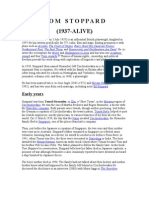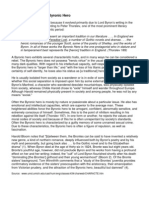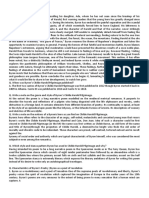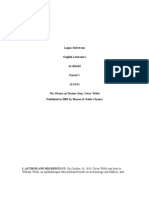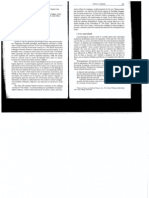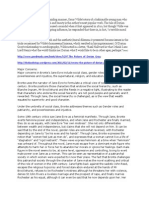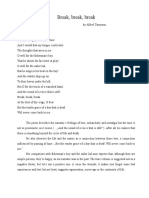0 ratings0% found this document useful (0 votes)
57 viewsGeorge Gordon Byron Was A British Poet and A Leading Figure in
George Gordon Byron Was A British Poet and A Leading Figure in
Uploaded by
GeaninaLucianaGeorge Gordon Byron was a leading British Romantic poet known for works like Childe Harold's Pilgrimage and Don Juan. Childe Harold's Pilgrimage is a long narrative poem describing a young man's travels through Europe as he reflects on life. It explores themes of disillusionment and establishes the archetype of the "Byronic hero" as an intelligent but rebellious outsider. The poem was influential in expressing the melancholy of its era following the Napoleonic Wars.
Copyright:
© All Rights Reserved
Available Formats
Download as DOC, PDF, TXT or read online from Scribd
George Gordon Byron Was A British Poet and A Leading Figure in
George Gordon Byron Was A British Poet and A Leading Figure in
Uploaded by
GeaninaLuciana0 ratings0% found this document useful (0 votes)
57 views1 pageGeorge Gordon Byron was a leading British Romantic poet known for works like Childe Harold's Pilgrimage and Don Juan. Childe Harold's Pilgrimage is a long narrative poem describing a young man's travels through Europe as he reflects on life. It explores themes of disillusionment and establishes the archetype of the "Byronic hero" as an intelligent but rebellious outsider. The poem was influential in expressing the melancholy of its era following the Napoleonic Wars.
Original Description:
Engleza
Original Title
George Gordon Byron
Copyright
© © All Rights Reserved
Available Formats
DOC, PDF, TXT or read online from Scribd
Share this document
Did you find this document useful?
Is this content inappropriate?
George Gordon Byron was a leading British Romantic poet known for works like Childe Harold's Pilgrimage and Don Juan. Childe Harold's Pilgrimage is a long narrative poem describing a young man's travels through Europe as he reflects on life. It explores themes of disillusionment and establishes the archetype of the "Byronic hero" as an intelligent but rebellious outsider. The poem was influential in expressing the melancholy of its era following the Napoleonic Wars.
Copyright:
© All Rights Reserved
Available Formats
Download as DOC, PDF, TXT or read online from Scribd
Download as doc, pdf, or txt
0 ratings0% found this document useful (0 votes)
57 views1 pageGeorge Gordon Byron Was A British Poet and A Leading Figure in
George Gordon Byron Was A British Poet and A Leading Figure in
Uploaded by
GeaninaLucianaGeorge Gordon Byron was a leading British Romantic poet known for works like Childe Harold's Pilgrimage and Don Juan. Childe Harold's Pilgrimage is a long narrative poem describing a young man's travels through Europe as he reflects on life. It explores themes of disillusionment and establishes the archetype of the "Byronic hero" as an intelligent but rebellious outsider. The poem was influential in expressing the melancholy of its era following the Napoleonic Wars.
Copyright:
© All Rights Reserved
Available Formats
Download as DOC, PDF, TXT or read online from Scribd
Download as doc, pdf, or txt
You are on page 1of 1
George Gordon Byron was a British poet and a leading figure in
the Romantic movement. Among Byron's best-known works are
the narrative poems Childe Harold's Pilgrimage and Don Juan.
Childe Harold's Pilgrimage is a long narrative poem in four parts that
describes the travels and reflections of a young man who, disillusioned with
a life of pleasure and revelry, looks for distraction in Europe. He starts the
journey of imitation from England and ends up in Russia. He looks at the
values of the society, at different civilization. In a wider sense, it is an
expression of the melancholy and disillusionment felt by a generation weary
of the wars of the post-Revolutionary and Napoleonic eras. The title comes
from the term childe, a medieval title for a young man who was a candidate
for knighthood.
The moods of Childe Harold are very diverse: self explorative moods
(from outside to inside); sometimes he becomes melancholic, polemic.
Byronic hero, as a complex personality
The work provided the first example of the Byronic hero. The idea of the
Byronic hero is one that consists of many different characteristics.
The hero must have a rather high level of intelligence and perception as well
as be able to easily adapt to new situations and use cunning to his own gain.
Generally, the hero has a disrespect for any figure of authority, thus creating
the image of the Byronic hero as an exile or an outcast. The hero also has a
tendency to be arrogant and cynical, indulging in self-destructive behaviour
which leads to the need to seduce women. Although his sexual attraction
through being mysterious is rather helpful, this sexual attraction often gets
the hero into trouble.
Childe Harold became a vehicle for Byron's own beliefs and ideas.
- themes: love, religion, faith, unconditional belief, artistic creation, outside
nature vs human nature, ideals of life and beauty, dream, a world of sorrow
and degradation, human destiny, human condition.
You might also like
- What The Butler SawDocument2 pagesWhat The Butler SawGeaninaLuciana20% (10)
- SavedDocument2 pagesSavedGeaninaLuciana100% (1)
- Enotes Childe Harolds Pilgrimage GuideDocument18 pagesEnotes Childe Harolds Pilgrimage GuideMEGHA GNo ratings yet
- Schemes and Tropes Used by Byronic Heroes To Achieve Further BroodinessDocument31 pagesSchemes and Tropes Used by Byronic Heroes To Achieve Further Broodinessapi-324333796No ratings yet
- Rosencrantz and Guildenstern Are DeadDocument6 pagesRosencrantz and Guildenstern Are DeadGeaninaLuciana100% (1)
- Tom StoppardDocument6 pagesTom StoppardGeaninaLucianaNo ratings yet
- Edward BondDocument10 pagesEdward BondGeaninaLuciana50% (2)
- Arnold WeskerDocument3 pagesArnold WeskerGeaninaLuciana0% (1)
- Harold PinterDocument19 pagesHarold PinterGeaninaLuciana67% (3)
- Byronic HeroDocument2 pagesByronic HeroLeonia StingaciNo ratings yet
- RESEARCH PAPER - Final DraftDocument14 pagesRESEARCH PAPER - Final DraftNataliaNo ratings yet
- The Byronic Hero: Abstract: George Gordon Byron Wrote Poetry of An Extraordinary Range and DiversityDocument6 pagesThe Byronic Hero: Abstract: George Gordon Byron Wrote Poetry of An Extraordinary Range and DiversityMohammed IbrahimNo ratings yet
- George Gordon Byron Writing StyleDocument3 pagesGeorge Gordon Byron Writing StyleTayyab RehmanNo ratings yet
- Microsoft Word - Characteristics of The Byronic HeroDocument1 pageMicrosoft Word - Characteristics of The Byronic Heroamcf1992No ratings yet
- ENGL404 Byronic Heroism FINALDocument3 pagesENGL404 Byronic Heroism FINALRossini09No ratings yet
- Lord Byron On MarmoreDocument7 pagesLord Byron On MarmoreThalNo ratings yet
- Byronic Hero NotesDocument18 pagesByronic Hero NotesAnonymous 7MQ7cylNo ratings yet
- 14 Wilde, O. - The Picture of Dorian GreyDocument6 pages14 Wilde, O. - The Picture of Dorian GreyhnnnnNo ratings yet
- The Literary Archetype of The Byronic HeroDocument2 pagesThe Literary Archetype of The Byronic HeroMarharyta VelychkoNo ratings yet
- Don Juan As A Byronic Hero. SH DDocument3 pagesDon Juan As A Byronic Hero. SH DShahnawaz HussainNo ratings yet
- Book ReviewDocument5 pagesBook ReviewMihaela CojocaruNo ratings yet
- Characteristics of The Byronic HeroDocument1 pageCharacteristics of The Byronic Heroمحمد سعيد طه100% (1)
- Byron CH Canto 3Document2 pagesByron CH Canto 3Sahildeep 1035No ratings yet
- Byronic Hero in English Romanticism: © June 2021 - IJIRT - Volume 8 Issue 1 - ISSN: 2349-6002Document3 pagesByronic Hero in English Romanticism: © June 2021 - IJIRT - Volume 8 Issue 1 - ISSN: 2349-6002Soniya KumariNo ratings yet
- Or LaDocument8 pagesOr LaHannah HalversonNo ratings yet
- Byronic HeroDocument2 pagesByronic HeroMonica AnghelNo ratings yet
- Research Paper About George Gordon LordDocument10 pagesResearch Paper About George Gordon LordMadalina BivolaruNo ratings yet
- TueWed Group 3 A Review of The Picture of Dorian Gray by Oscar WildeDocument49 pagesTueWed Group 3 A Review of The Picture of Dorian Gray by Oscar WildeTrung NguyễnNo ratings yet
- Lecture Notes by Ananya Bose - Lord ByronDocument4 pagesLecture Notes by Ananya Bose - Lord ByronpoojaNo ratings yet
- Byronic Hero MoodDocument23 pagesByronic Hero MoodMd TazbirNo ratings yet
- The Gothic ProtagonistDocument31 pagesThe Gothic Protagonistapi-301037423No ratings yet
- Dorian's Characterizations in Oscar Wilde's The Picture of Dorian Gray: A Formalism and Psychoanalytical ReadingDocument10 pagesDorian's Characterizations in Oscar Wilde's The Picture of Dorian Gray: A Formalism and Psychoanalytical ReadingSneha PradhanNo ratings yet
- TG VillarRodríguezT TheByronicHeroDocument16 pagesTG VillarRodríguezT TheByronicHeroMd TazbirNo ratings yet
- The Picture of Dorian Gray - Oscar WildeDocument8 pagesThe Picture of Dorian Gray - Oscar WildeSanchez DagaNo ratings yet
- BA Total ByronicDocument26 pagesBA Total ByronicErrisona Mei Sandi 'Adarqiz'0% (1)
- Romanticism and ByronDocument3 pagesRomanticism and ByronPaulescu Daniela AnetaNo ratings yet
- Romanticism and ByronDocument3 pagesRomanticism and ByronPaulescu Daniela AnetaNo ratings yet
- Sons and Lovers As A Bildungsroman Novel Bildungsroman NovelDocument5 pagesSons and Lovers As A Bildungsroman Novel Bildungsroman Novelnf1443194No ratings yet
- DUALITY Docx1Document11 pagesDUALITY Docx1Світлана ЧерноваNo ratings yet
- Literary Analsis Dorian GrayDocument4 pagesLiterary Analsis Dorian GrayFero Brzda100% (3)
- Childe Harold's PilgrimageDocument5 pagesChilde Harold's PilgrimagedjenanaNo ratings yet
- RC Dorian GrayDocument16 pagesRC Dorian GrayMicheleKrnjakNo ratings yet
- Kramer 0Document8 pagesKramer 0Mariou90100% (1)
- Comparative Analysis of Two Novels: "The Road" by Cormac Mccarthy and "The Picture of Dorian Gray" by Oscar WildeDocument21 pagesComparative Analysis of Two Novels: "The Road" by Cormac Mccarthy and "The Picture of Dorian Gray" by Oscar WildeNur Hairunnisa' AnnuriNo ratings yet
- Bildungsroman Catcher in The RyeDocument12 pagesBildungsroman Catcher in The RyeHavvaNo ratings yet
- The Symbolic Meanings of A Portrait in Oscar WildeDocument3 pagesThe Symbolic Meanings of A Portrait in Oscar WildeМарта ДацьNo ratings yet
- Dorian GrayDocument2 pagesDorian Graylucascordova2312No ratings yet
- Religious Ideology in Oscar Wilde's NovelDocument9 pagesReligious Ideology in Oscar Wilde's NovelBivolaru Teodor MarianNo ratings yet
- The Catcher in The Rye - Class 2Document10 pagesThe Catcher in The Rye - Class 2Amanda MottaNo ratings yet
- The Byronic HeroDocument5 pagesThe Byronic HeroStanley Sfekas0% (1)
- англияDocument4 pagesанглияdeneeva.a03No ratings yet
- Heathcliff As Byronic Hero in Emily BrontëDocument8 pagesHeathcliff As Byronic Hero in Emily BrontëNatek07No ratings yet
- Book Reviw The Picture of Dorian GrayDocument6 pagesBook Reviw The Picture of Dorian GrayBARSHANo ratings yet
- Gabriel Conroy's PsychDocument22 pagesGabriel Conroy's PsychTatjana Ristić100% (2)
- The Gothic ProtagonistDocument4 pagesThe Gothic Protagonistapi-301037423100% (1)
- Notes3 - Lord Byron and Percy ShelleyDocument1 pageNotes3 - Lord Byron and Percy ShelleyDavid WilliamsNo ratings yet
- Bookreview The Catcher in The RyeDocument7 pagesBookreview The Catcher in The RyeHewlett PearlNo ratings yet
- Henderson The Rain King and The Adventures of Augie March: Human Quest in Saul Bellow's NovelsDocument9 pagesHenderson The Rain King and The Adventures of Augie March: Human Quest in Saul Bellow's Novelsdenissb1No ratings yet
- VictorianaDocument30 pagesVictorianacatalin_73518618No ratings yet
- Nordic Gods and Heroes HandoutDocument1 pageNordic Gods and Heroes HandoutJanel GalnaresNo ratings yet
- Byron - Wrath and Rhyme - Bold, Alan Norman, 1943 - 1983 - London - Vision - 9780854783557 - Anna's ArchiveDocument224 pagesByron - Wrath and Rhyme - Bold, Alan Norman, 1943 - 1983 - London - Vision - 9780854783557 - Anna's ArchiveDevika DineshNo ratings yet
- Elements of A Gothic Novel in The Picture of Dorian GrayDocument5 pagesElements of A Gothic Novel in The Picture of Dorian GrayFrederika MichalkováNo ratings yet
- Heathcliff Byronic Hero ThesisDocument7 pagesHeathcliff Byronic Hero Thesisdwt3zbkq100% (2)
- Issue of Identity-Washington IrvingDocument3 pagesIssue of Identity-Washington IrvingAlexandra PoluiaktovNo ratings yet
- Alfred Tennyson, Break Break, BreakDocument2 pagesAlfred Tennyson, Break Break, BreakGeaninaLucianaNo ratings yet
- Plug 1,2Document3 pagesPlug 1,2GeaninaLucianaNo ratings yet
- TV& Radio 2Document9 pagesTV& Radio 2GeaninaLucianaNo ratings yet
- Sonnet 97 by ShakespeareDocument2 pagesSonnet 97 by ShakespeareGeaninaLucianaNo ratings yet
- TV& RadioDocument2 pagesTV& RadioGeaninaLucianaNo ratings yet
- Alfred Tennyson, One of The Most Popular Poets in The English LanguageDocument2 pagesAlfred Tennyson, One of The Most Popular Poets in The English LanguageGeaninaLucianaNo ratings yet
- Can-Could-To Be Able To 1Document12 pagesCan-Could-To Be Able To 1GeaninaLucianaNo ratings yet
- English AuthorsDocument34 pagesEnglish AuthorsGeaninaLucianaNo ratings yet
- Samuel Taylor ColeridgeDocument2 pagesSamuel Taylor ColeridgeGeaninaLucianaNo ratings yet
- Exercises 1Document4 pagesExercises 1GeaninaLucianaNo ratings yet
- The Didactic Scenario: Teacher's Activity Students' ActivityDocument9 pagesThe Didactic Scenario: Teacher's Activity Students' ActivityGeaninaLucianaNo ratings yet
- Present Perfect Simple and ContinuousDocument4 pagesPresent Perfect Simple and ContinuousLeonte ȘtirbuNo ratings yet
- The Importance of Being EarnestDocument3 pagesThe Importance of Being EarnestGeaninaLucianaNo ratings yet
- Serjeant Musgrave's Dance, An Un-Historical Parable Is A Play by English PlaywrightDocument3 pagesSerjeant Musgrave's Dance, An Un-Historical Parable Is A Play by English PlaywrightGeaninaLucianaNo ratings yet
- John ArdenDocument1 pageJohn ArdenGeaninaLuciana100% (1)
- John OsborneDocument10 pagesJohn OsborneGeaninaLucianaNo ratings yet
- Joe OrtonDocument6 pagesJoe OrtonGeaninaLuciana0% (1)
- George Bernard ShawDocument4 pagesGeorge Bernard ShawGeaninaLucianaNo ratings yet
- "The Caretaker": Origins and Contexts of The PlayDocument9 pages"The Caretaker": Origins and Contexts of The PlayGeaninaLucianaNo ratings yet
- Samuel BeckettDocument8 pagesSamuel BeckettGeaninaLuciana100% (1)





